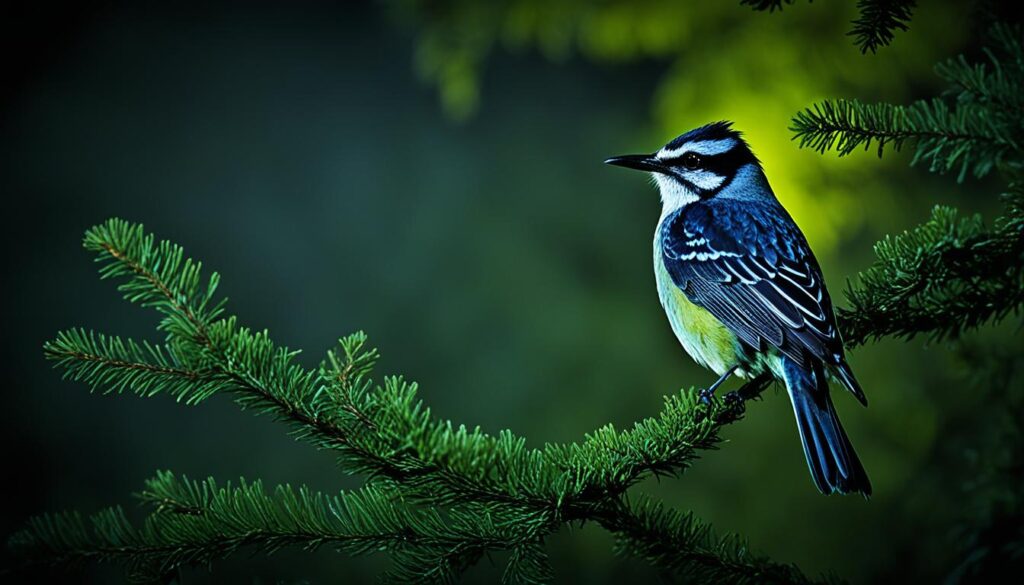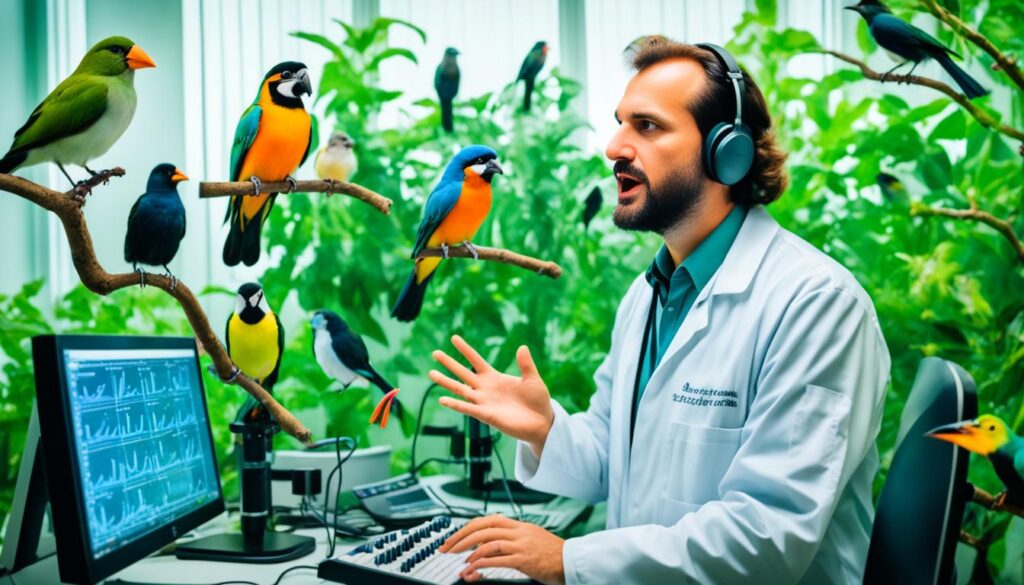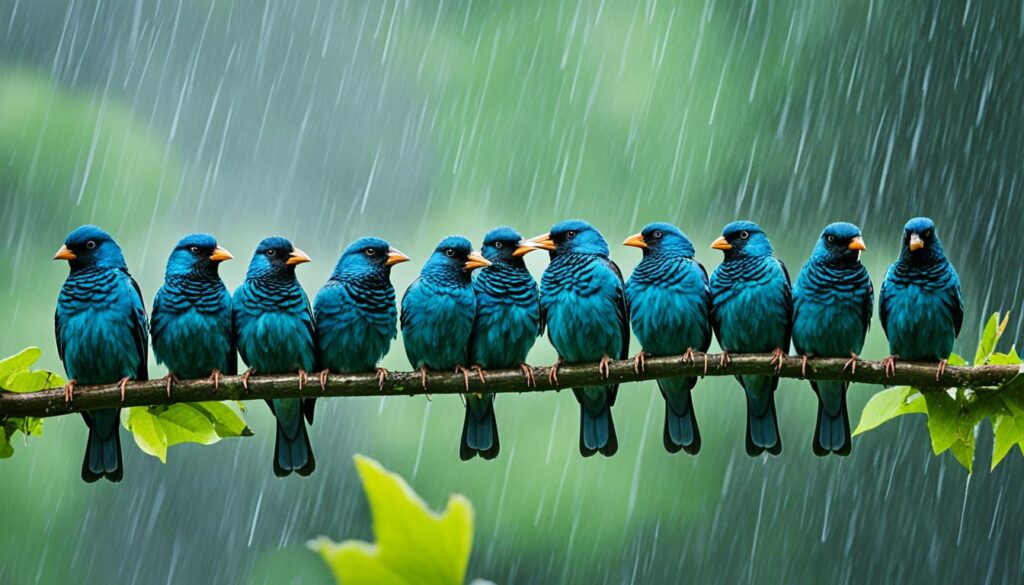Before the sun rises, the world is dark, but birds start to sing. This is called the dawn chorus. It’s like nature’s alarm clock, waking up the day. But why do birds wake up so early, and what makes them start singing?
Key Takeaways
- Birds wake up one to two hours before sunrise, using the early morning for singing and other activities.
- The dawn chorus, where birds sing a lot before sunrise, is mainly done by male birds. They sing to mark their territory or attract mates.
- Different bird species wake up at different times. For example, American robins wake up at 3 am, while chaffinches wake up close to sunrise.
- Light pollution affects when birds wake up. Birds in cities start their dawn chorus much earlier than those in the wild.
- The morning quiet helps bird songs travel farther. This makes it easier for birds to talk to each other.
Understanding the Dawn Chorus
As the first light of dawn creeps over the horizon, a captivating symphony of birdsong fills the air. This phenomenon, known as the dawn chorus, is a remarkable display of avian morning routines. It showcases the birdsong phenomenon, territorial claims, and mating calls of various bird species.
What is the Dawn Chorus?
The dawn chorus is the collective chatter and chirps of wild birds, most noticeable during the spring breeding season. Studies show that the dawn chorus typically occurs from March to July, with the peak happening in May and June. The first birds start singing about an hour before sunrise, and the chorus reaches its greatest intensity approximately 30 minutes before and after sunrise.
The Significance of Bird Songs at Dawn
- The dawn chorus serves to defend territories and attract mates, as male birds are the loudest voices in this musical display.
- The morning stillness in the air makes birdsong louder and clearer compared to other times of the day, enabling sound to travel further.
- Singing in the morning is advantageous for birds, as it is a safe time with lower humidity and cooler temperatures.
The dawn chorus is a captivating reminder of the vibrant avian morning routines that unfold each day. It showcases the birdsong phenomenon and the importance of territorial claims and mating calls in the lives of our feathered friends.
Factors Influencing Bird Wake-up Times
Birds wake up based on many things like light, seasons, weather, and where they live. These factors mix together to set their daily routines.
Light Levels and Seasonal Changes
Birds start their day as light gets brighter in the morning. The amount of daylight changes with the seasons. This affects when birds wake up.
For example, in the breeding season, some birds wake up early to find food and build nests.
Weather Conditions and Geographic Location
Weather like temperature and rain can change when birds wake up. Cold or rain might make them wait to leave their nests.
Where birds live also plays a part. Birds in different places wake up at different times because of the sunrise.
Scientists have studied how birds’ internal clocks and the environment work together. They found out how these things affect when birds wake up.

“The dawn chorus is a daily phenomenon that occurs during the first light of day, indicating that birds wake up early in the morning to create a harmonious cacophony.”
Typical Wake-Up Times for Common Bird Species
Wake-up times for birds vary a lot, showing their unique avian circadian rhythms. Robins and blackbirds wake up up to 80 minutes before the sun rises. On the other hand, nocturnal birds like owls wake up at night and before dusk, not at dawn.
Diurnal birds like song sparrows wake up 30-60 minutes before the sun rises. The American Goldfinch and House Finch wake up 15-30 minutes before daybreak. Their wake-up times are affected by light levels and seasonal changes.
“Birds are nature’s alarm clocks, and their morning songs are a symphony that greet the dawn.” – Unknown
Learning about bird species wake-up times helps us understand avian behavior and nature’s cycles.
If you’re an early bird or love quiet mornings, listening to local birds can be rewarding. Watching their daily routines helps us appreciate their lives more.
Reasons Why Birds Wake Up Early
Birds wake up early to greet the dawn with their songs. This early morning activity is important for them.
Foraging for Food
Birds wake up early to find the best food. Being the first to the food can be crucial for their survival. This is especially true during hard times or in harsh seasons.
Attracting Mates and Defending Territory
The dawn chorus helps birds find mates and protect their territory. Male birds sing a lot in the early morning. They use their songs to show they’re there and to claim their territory. A strong song can help them find a mate.

“Birds sing loudly in the predawn hours when it is too dark for predators to hunt and when there is less background noise, allowing their songs to carry up to 20 times further than later in the day.”
The dawn chorus helps birds be seen by fewer predators. This lets them show they’re there and protect their territory safely.
The Advantage of Early Risers
As dawn breaks, birds start to chirp, signaling a new day. Early risers gain a big edge over those who sleep in. They get to grab the best food sources, avoid predators, and find mating opportunities early.
Early birds beat the competition to get the best food sources. This means they don’t have to worry about going hungry. Plus, they can sing and claim their territory without worrying about being caught by predators.
“The still, dense air during the dawn chorus enables male birds to attract mates from a greater distance.”
The dawn chorus also helps birds find mates. The quiet air lets male birds sing louder, drawing in potential partners from far away. This boosts their chances of finding a mate and having babies.
In the bird world, being an early bird really pays off. These birds make the most of their early rise. They get the best resources and find mates, thanks to their early start.
Do All Birds Follow the Same Schedule?
Most birds wake up early, but not all have the same sleep habits. Nocturnal birds, like owls and nighthawks, are active at night. They wake up much later than diurnal birds, which are active during the day.
In cities, some birds change their sleep times because of the different light and human activity. These urban bird adaptations can make their sleep patterns change. Some birds wake up earlier or later than they would in the wild.
- Robins wake up early, up to 80 minutes before sunrise.
- Blackbirds wake up early, up to 70 minutes before sunrise.
- Song Sparrows start their day at first light, about 30-60 minutes before sunrise.
- Owls, being nocturnal birds, are active during the pre-dawn or night hours.
Different birds have different sleep patterns. This shows how adaptable and resilient birds are. Each species finds its own way to survive in changing environments.

“Birds wake up at about 4 am or an hour before sunrise to start singing their dawn choruses.”
What time do birds wake up?
Birds wake up at different times for many reasons like their type, where they live, the season, and the weather. Some birds start their day very early, singing up to 80 minutes before the sun comes up. But, the exact time they wake up can change a lot among birds.
Some birds, like owls and nighthawks, are awake when the sun sets and hunt at night. Most birds, though, are active during the day and sleep at night. They have special feathers to stay warm and a strong grip on their perches so they don’t fall.
- Waterfowl and shorebirds often sleep near water sources.
- Some birds, like ducks and waterfowl, can sleep with one half of their brain being alert (unihemispheric slow-wave sleep).
- Migrating birds, such as the Alpine Swift, can even sleep while flying, allowing for continuous flight for long periods.
The dawn chorus, where birds sing together in the morning, can start as early as 4:00 a.m. and go on for hours. Male birds are mostly the ones singing in the dawn to attract mates and mark their territory. Singing in the morning lets them show off their strength and health to other birds.
Recent research shows that birdsong travels just as far, if not farther, at noon as it does at dawn, contrary to previous beliefs.
The songs in the early morning are clearer and more consistent than at other times. This helps birds recognize each other by their unique songs. Scientists have looked into why birds sing so much in the morning. They want to know how their songs spread and how light affects their singing.
Seasonal Variations in Bird Wake-Up Times
Birds have their own alarm clocks that change with the seasons. As daylight hours change, birds wake up at different times. In summer, they wake up early, often before the sun rises. In winter, they wait for the sun to warm things up before starting their day.
Summer vs. Winter
Birds wake up earlier in summer because they need to find food and take care of their young. The dawn chorus, a beautiful sound of birds singing, happens most in summer. This is when breeding season is busiest.
In winter, birds sleep in a bit longer. They have thick feathers and extra fat to keep warm. This lets them wait for more daylight before waking up. It helps them avoid cold mornings and find food when it’s dark.

“Birds are like nature’s clock-watchers, adjusting their wake-up times with changing seasons.”
Birds change their sleep schedules with the seasons. They show how well they can adapt to changes in daylight and temperature. This shows how strong and flexible our bird friends are.
The First Birds to Greet the Dawn
As the sky starts to light up with dawn’s first rays, a beautiful sequence of bird songs fills the air. This dawn chorus is not just noise. It’s a well-planned performance, with each bird species singing its part to welcome the day.
American robins, blackbirds, and thrushes are often the first to start singing, as early as 3 AM. Their songs set the tone for the chorus. Then, wood-pigeons, wrens, and warblers join in, adding to the music.
As morning gets brighter, great tits, blue tits, sparrows, and finches add their songs. This bird species hierarchy unfolds with amazing precision. It creates a captivating dawn chorus sequence that marks the start of a new day.
“Listening to the dawn chorus is a truly magical experience, a reminder of the natural rhythms that have persisted long before humans.”
For those who watch the early morning singers, the dawn chorus is special. It’s a chance to see into the lives of our feathered friends. This symphony delights our senses and teaches us about the behaviors and adaptations of these amazing creatures.
The Role of Light Pollution
Light pollution is a big problem in cities and affects birds. It makes them wake up too early. Street lamps and other artificial lights trick birds into thinking it’s daybreak.
This makes the dawn chorus, a beautiful morning song, start up to 30 minutes too early. Birds wake up and start their day early because of this.
This change can really impact urban birds. It affects how they find food, mate, and migrate. It’s a big deal for their survival.
For instance, European blackbirds in cities sing 45 minutes too early compared to those in forests. American robins also change their singing times because of city lights. Some even sing all night instead of just at dawn.
“Light pollution is a significant threat to urban bird populations, as it can disrupt their natural rhythms and behaviors, ultimately affecting their survival and reproduction.”
Cities are trying to help by turning off unnecessary lights during migration or at night. This reduces artificial light and helps birds keep their natural cycles.

As cities grow, we need to focus on light pollution’s effects on birds. By understanding how artificial light affects them, we can make cities better for birds. This helps protect these urban birds.
Listening to Nature’s Alarm Clocks
The Charm of the Dawn Chorus
Watching birds wake up and listening to the dawn chorus is fun and educational. The sounds of nature in the morning are uplifting and inspiring. They help us connect with nature and learn about birds.
The dawn chorus happens from March to July. Birds sing to find a place to live and find a mate. The singing starts with robins and blackbirds, then other birds join in. By late summer, birds stop singing as they focus on their young.
The dawn chorus sounds are soothing and captivating. Studies show that natural sounds can reduce stress and help our minds and bodies relax. With more noise in nature, it’s important to keep these quiet moments safe.
“The sound of birds triggers physical relaxation and cognitive stimulation.”- Julian Treasure, The Sound Agency
Listening to the dawn chorus takes us to a peaceful place. It brings back happy memories and makes us feel good. Sounds from nature, like birds or rain, can captivate and heal us.
Seeing the dawn chorus can change us. It helps us see the beauty and complexity of nature up close. By listening to nature’s morning serenades, we find wonder and connection that makes our lives better.
The Science Behind Bird Songs
Scientists have always been curious about the dawn chorus. This is the beautiful sound of birds singing at first light. They have looked into many theories to figure out why birds sing so early.
Theories on Early Morning Singing
One idea is that the early morning is best for birds to make their sounds heard. With less wind and noise, their songs can go farther. This helps them talk to each other and mark their territory. This better sound carrying could be why birds sing in the early morning.
Another theory says that male birds sing to show they are strong and healthy. Singing in the cold, before eating, takes a lot of energy. It shows they can overcome challenges and are fit.
“The dawn chorus serves multiple purposes, such as resolving conflicts before physical fights break out and advertising the singer’s quality to potential mates.”
Changes in hormones, like more testosterone, also affect when and how birds sing. These changes make birds want to communicate, protect their territory, and find a mate.

The dawn chorus has fascinated both bird lovers and scientists. Their ongoing studies reveal more about the amazing world of avian communication.
Interspecies Differences in Wake-Up Times
Most birds wake up at dawn, but different species have their own times. Diurnal birds like robins and sparrows start their day before the sun rises. Nocturnal birds, such as owls, are active at night and wake up around dusk. These differences show how diverse birds can be.
There are about 10,000 bird species on Earth, each with unique behaviors. Around 80% stay in the same place all year, while 20-40% migrate. Some birds migrate because of the weather or lack of food, while others do it every year.
Some birds move around looking for food, unlike traditional migration. Others move within their area in different ways. These habits lead to different sleep patterns in birds.
“Migration in birds is believed to have evolutionary benefits, facilitating survival and reproductive success by optimizing environmental conditions across different locations.”
Learning about the sleep patterns of different birds helps us understand their world better. It shows how birds adapt to their environments in unique ways.
Observing the Avian Morning Routine
For nature lovers, watching birds wake up and start their day is both fun and educational. By getting up early and going outside before the sun rises, you can see the dawn chorus start. This lets you learn about how birds adapt and behave to survive.
Birds start singing 30 – 90 minutes before the sun comes up. Each type of bird sings at different times during this morning song. This singing does many things, like showing off to potential mates or marking their territory. Male birds sing the most, especially when they’re looking for a mate.
Studies show that the loudness and variety of the dawn chorus can tell us a lot. For example, a study in the Journal of Behavioural Ecology found that birds near airports time their songs to avoid noise from planes. Another study in the Journal of Oecologia showed that male great tits in dirty areas sang fewer songs than those in cleaner areas.
By experiencing birdwatching and the dawn chorus for yourself, you can really appreciate nature appreciation. From the first quiet chirps to the loud chorus, the morning routine of birds shows us the beauty of nature.
“The dawn chorus is nature’s alarm clock, a symphony that heralds the start of a new day and a reminder of the beauty that surrounds us.”

Conclusion
Birds wake up at different times, showing us the beauty of nature. Some birds, like robins and blackbirds, wake up early. Others take their time. This shows how adaptable birds are.
Learning about bird wake-up times and the dawn chorus helps us appreciate nature more. It shows us how birds play a big part in nature. They help keep the ecosystem balanced.
If you love birds or just enjoy nature, learning about bird wake-up times is rewarding. Listening to the dawn chorus connects us to nature deeply. It helps us understand and respect life around us more.
The beauty and rhythms of birds remind us of life’s strength and adaptability. By paying attention to avian wake-up times and the dawn chorus, we grow our love for nature appreciation. This helps us work to protect our planet’s delicate balance.
FAQ
What time do birds wake up?
Birds wake up at different times, just like humans. They follow a natural cycle that tells them when to sleep and when to wake. This can be before the sun rises or right after it does, depending on many factors.
What is the Dawn Chorus?
The dawn chorus is when wild birds make lots of noise together. This happens mostly in spring. They do this to claim their territory or find a mate. Mostly, the sounds come from male birds.
What is the significance of bird songs at dawn?
Bird songs at dawn are very important. They help birds defend their territory, find a mate, and show how healthy they are. It’s a key part of their morning.
What factors influence bird wake-up times?
Many things affect when birds wake up. These include how bright it is, the season, the weather, and where they live. Birds use the light around them to know when it’s day, which tells them it’s time to start their day.
What are the typical wake-up times for common bird species?
Some birds, like robins and blackbirds, wake up really early, up to 80 minutes before the sun comes up. Song sparrows wake up a bit later, 30-60 minutes before sunrise. Owls, which are active at night, wake up before dusk, not at dawn.
Why do birds wake up early?
Birds wake up early for important reasons. They want to get to the best food sources, find a mate, and claim their territory when there are fewer predators around.
What are the advantages of being an early riser for birds?
Being up early has its perks for birds. It makes it safer for them to sing and mark their territory because predators can’t see as well. Also, they get to eat before others do, which is important for survival.
Do all birds follow the same schedule?
No, not all birds wake up at the same time. Owls and nighthawks, for example, are active at night. Some birds in cities might also change their schedules because of people and artificial light.
How do seasonal changes affect bird wake-up times?
Seasons change when birds wake up. In summer, with longer days, they wake up earlier. In winter, with shorter days, they wake up later because the sun rises later.
Which birds are the first to greet the dawn?
American robins, blackbirds, and thrushes are often the first to sing in the morning, starting as early as 3 AM. Later, wood-pigeons, wrens, and warblers join in. Great tits, blue tits, sparrows, and finches start singing when it’s light enough for them to see.
How does light pollution affect bird wake-up times?
Light pollution from city lights can mess with birds’ natural wake-up times. It can make them start singing up to 30 minutes earlier than usual. They think the extra light means it’s already day.
What are the theories behind the dawn chorus and early morning singing in birds?
Scientists have a few ideas about why birds sing in the early morning. One theory is that it’s best for sound to travel far. Another is that singing shows how strong and healthy the male birds are.
How can one observe the wake-up times and morning routines of birds?
To see how birds wake up, set an early alarm and go outside before the sun rises. This way, you can hear the dawn chorus and learn about how birds adapt and behave in the morning.

